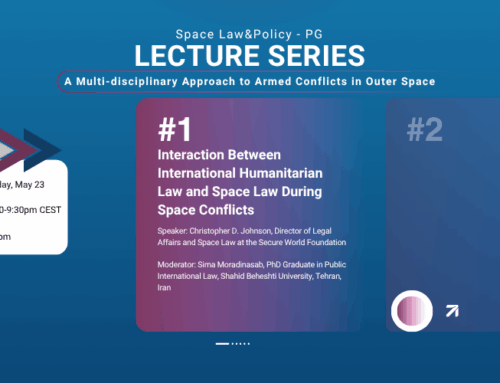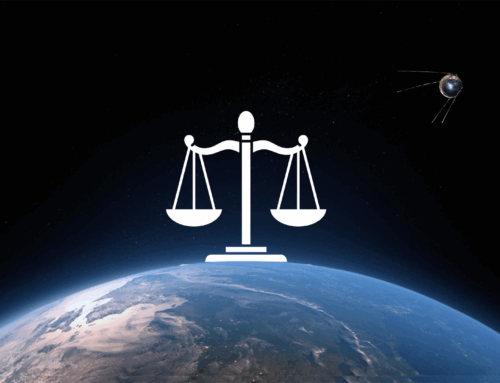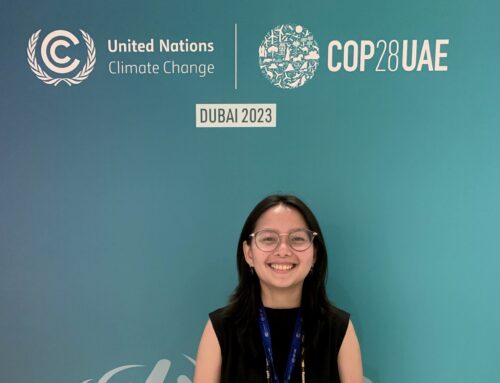The most important thing is “How seriously do you take the responsibilities that have been assigned to you?”. The output one generates is dependent on this question.
What’s behind one of the backbone roles within the SLP Leadership?
At the heart of the Space Law and Policy Project Group, research isn’t just an activity, it is our mission. It is how we contribute to evolving space law and policy conversations, address real-world legal and policy challenges, and ensure that space remains a domain governed by foresight and responsibility. Each year, our research groups deliver impactful publications, insightful events, and international collaborations that shape the future of space governance.
But none of this would be possible without the strategic leadership behind the scenes.
Research Coordinators represent one of the bedrocks of SLP. They shape the direction, maintain the integrity, and support the process behind every research initiative. They are the engine room: quietly powerful, relentlessly focused, and essential to the mission. Their work ensures that every idea is developed with rigor, every team is supported, and every project contributes meaningfully to our mission.
With two Research Coordinator positions now open, we sat down with our incredible outgoing coordinators, Angelika Pizarro and Pankaj Mehta, to hear what it is really like to hold one of the most critical roles within SLP leadership.
From their biggest takeaways to honest advice and personal reflections, their insights offer a precious look into a role that might just be your next step.
How would you describe your experience as SLP Research Coordinator?
A: My experience was truly fulfilling. I applied for the position just believing I could manage the job based on the role description. Now, looking back on the past 3 project cycles, I can say we’ve accomplished more than we expected and with that I will be forever grateful for what this opportunity has brought to my life. I felt that just as the research co-leads and members we worked through their respective projects, we were also constantly learning alongside them. The beauty of the role is that you have a birds eye view of the entire process, from start to finish, and you get to witness the growth of everyone.
P: Serving as the SLP Research Coordinator has been an incredibly rewarding experience. It allowed me to lead a global team of researchers, develop long-term strategies for impactful space law and policy projects, and contribute to SGAC’s mission of fostering the next generation of space professionals. I was responsible for overseeing project timelines, supporting research quality, coordinating project leads, and ensuring global visibility for the group’s work. The role gave me a unique opportunity to combine strategic leadership with substantive research in emerging areas of space governance.
What was the most rewarding project you worked on?
A: No specific project but just to be able to see the research teams representing SGAC in different fora has always been a source of pride and sense of fulfillment for me.
P: One of the most rewarding projects was coordinating the research and outreach strategy that led to the development of our upcoming book on AI and Space Law. We not only brought together a diverse set of authors and researchers but also helped shape one of the first youth-led efforts to systematically examine how emerging technologies intersect with outer space governance. The interest it generated within the community and the collaboration it fostered across continents were truly inspiring.
What’s your advice in overcoming challenges related to this role?
A: I found it most challenging when it’s crunch time for review of all outputs of all research teams. My advice is to make sure you set up deadlines that are workable for the teams but also manageable for you. I can say this role will really test your time and people management skills which in itself is a challenge but at the same time a huge learning opportunity.
P: The biggest challenge was managing a global, volunteer-driven team across different time zones and balancing varying levels of commitment. It required patience, adaptability, and proactive communication. My advice would be to set clear timelines with built-in buffer periods, maintain regular check-ins, and create a culture of shared accountability and recognition.
Also, being flexible and empathetic goes a long way in keeping a motivated and resilient team.
How did this role help you grow in your professional career?
A: I applied to SLP just knowing I wanted to get more exposure to space law and policy work and the “international” aspect of it. It hasn’t been a year since I resigned from my work at the Philippine Space Agency when I applied for the role. Three project cycles later, I can confidently say I am now sure this is exactly what I wanted to pursue and that I am willing to put in the work to become a space lawyer for the Philippines. Working with space lawyers and experts on the field from different countries broadened my perspective of future career possibilities and inspired me to pursue law studies. And now, I will be starting my law school journey in August.
P: This role was instrumental in sharpening my project management, strategic planning, and leadership skills. I learned how to drive initiatives from idea to impact, manage stakeholder expectations, and synthesize technical and legal insights for global audiences. It also helped me build a strong network of professionals and opened doors to collaborative opportunities, including speaking at conferences and contributing to policy discussions.
Any advice for someone considering applying?
A: Don’t think this is going to be a walk in the park, because it won’t be. But I can assure you that as long as you are willing to learn the ropes of the job, it will get easier day by day. Working with the right people (core leadership team and research co-leads) definitely makes the job a lot easier so it’s very important to get to know people and build rapport (and not just network) with them. More importantly, you have to be willing and comfortable in working behind the scenes because I would say 90% of the work of research coordinators is providing all the research teams with the necessary support and direction, and that, for me, has always been a humbling experience.
P: Absolutely. If you’re passionate about space law and policy and want to work at the intersection of research, strategy, and leadership—go for it. It’s a high-impact role where your ideas can shape real-world discussions. My advice:
- Come in with a vision
- Be proactive in team engagement
- Treat each project as a learning opportunity
- Prioritise communication and time management.
This role is as enriching as the effort you put into it.
What’s one thing you didn’t expect to gain from the role, but did?
A: Colleagues and confidants that I can confidently say I have built good personal and working relationships with. I am manifesting that I will have another opportunity to work with them in some capacity.
P: I didn’t expect to build such a close-knit and supportive community. Many of us continued to collaborate even after the projects ended, and I developed meaningful professional relationships and friendships that I truly value. I also didn’t expect to gain so much confidence in leading complex initiatives and making strategic decisions that shaped the group’s long-term trajectory.
P.S. The most important thing is “How seriously do you take the responsibilities that have been assigned to you?”. The output one generates is dependent on this question.
Ready to Take the Lead?
If you’re passionate about research, committed to shaping the future of space law and policy, and eager to grow as a leader, this is a golden opportunity.
We are currently accepting applications for two Research Coordinator positions within the Space Law and Policy Project Group. This is your call to step into one of the most impactful roles in our leadership team, guiding innovative research, supporting diverse teams, and influencing strategic direction on a global scale.
📅 Apply by 11 July 2025
🌐 Application Form






